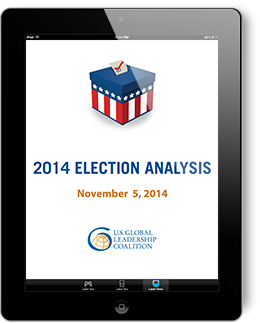

Foreign policy was merely a footnote at the start of this year’s midterm election cycle. Domestic issues dominated the debate and many wondered whether this cycle would mirror past election years when freshmen members bragged they didn’t own passports.
Most of the results are in, and while the pundits will focus on the change of power in the Senate, our pick for Election 2014’s biggest loser is isolationism. Here’s how our issue fared:
1. World Crises Dramatically Changed Voter’s Priorities. As campaign 2014 got underway, polling consistently showed a historic low in Americans’ interest in international engagement. But the crisis in Ukraine and ISIS jolted Americans, and by late September, 78 percent of Americans said the situation with ISIS was extremely/very important to their vote, ahead of the deficit and taxes. The Ebola epidemic further heightened voters’ concern about events overseas and 83 percent of Americans called for “strong U.S. leadership” in the world according to an October poll. This dramatic turn of world events propelled foreign affairs issues into voters’ minds, and ultimately into the 2014 campaigns.
2. Candidates Embraced Global Engagement and Rejected Isolationism. In January, we scoured candidates’ websites and were dismayed by how few even mentioned foreign policy positions. By the fall, candidates had reacted to world events and incorporated foreign policy issues into their stump speeches. Fall debates were filled with candidates taking jabs at one another on these issues. Over the past year the USGLC met with nearly 100 candidates across the nation, and without exception, candidates talked about the importance of America being engaged in the world. Not a single candidate called for an isolationist approach to foreign policy. Many winners have strong records of support on foreign assistance from their days in the House, even candidates endorsed by Tea Party groups.
3. Foreign Aid was Absent from the Campaign. Foreign aid was a non-issue in the election – and that is certainly good news. In 2012, several ads attacked incumbents for supporting foreign aid and a few incumbents criticized foreign assistance. In contrast, only one ad mentioned foreign assistance this year – a small ad buy from Senator Rand Paul’s (R-KY) political action committee (RANDPAC) less than a week before the election, in support of Senator Pat Roberts (R-KS) for opposing foreign assistance to countries such as Egypt, Pakistan, and Libya.
4. Our Champions are in Influential Positions. In a testament to the breadth of bipartisan support for U.S. global engagement, committee leadership in the 114th Senate will be comprised of champions of the International Affairs Budget. Unlike in the 2006-2010 elections when we lost about two-thirds of our GOP Senate champions, the new Congress will see strong supporters emerging in key committee leadership positions including Senator Bob Corker (R-TN) chairing Senate Foreign Relations, Senator John McCain (R-AZ) chairing Armed Services, and Senator Lindsey Graham (R-SC) chairing the State-Foreign Operations Appropriations Subcommittee among others.
5. Many Freshmen Have Strong Military and Business Backgrounds. In addition to long-time friends in the Senate and House who will be returning, we are pleased to see many newly elected Senators and Representatives with an interest in, and experience with, international affairs programs. Among the new Senators, for example, a number have military or extensive international business experience. Senator-elect Tom Cotton for example talks about how his military experience shaped his support for global development and diplomacy. Senators-elect Steve Daines, David Perdue, Ben Sasse, and Thom Tillis will bring their international business expertise to the Senate and that could be an opportunity.
6. Candidates Want to Learn More about Our Issues. In our meetings with candidates, almost all of the incoming policymakers were eager to learn how our civilian programs benefit America’s security and economic interests. While they universally are internationalists, few are familiar with global development and diplomacy policy. One Senate candidate remarked that while he knew foreign aid was less than 20 percent of the federal budget, he had no idea it was just 1 percent. Despite the lack of information, it was not unusual for candidates to say they believe we cannot be isolationists and need appropriate non-military tools to engage with the world. We have work to do, but it is a solid starting point.
7. The Growing Frustration with Partisan Gridlock has Created a Bipartisan Opening. Nearly a third of voters in a late October Wall Street Journal/NBC News poll ranked “ending gridlock/getting things done” as their most important issue– well above the deficit, government spending, and healthcare. As one of a few remaining bipartisan issues, foreign assistance programs could be an important area of consensus and action on both sides of the aisle in the 114th Congress.
